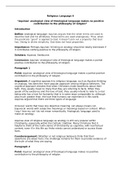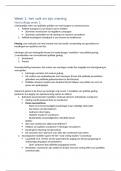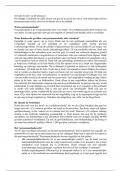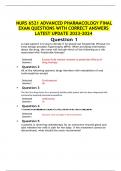Summary
Summary Religious language II: Twentieth century perspectives ESSAY PLANS- Philosophy & Ethics A Level OCR
- Module
- Philosophy of Religion
- Institution
- OCR
5 ESSAY PLANS These essay plans helped me get an A* overall in OCR Philosophy & Ethics (Full Marks on ethics paper). Essay plans discussing the complexities surrounding Religious language: Twentieth century perspectives. The essay plans have a particular focus on AO1, so that students are abl...
[Show more]













